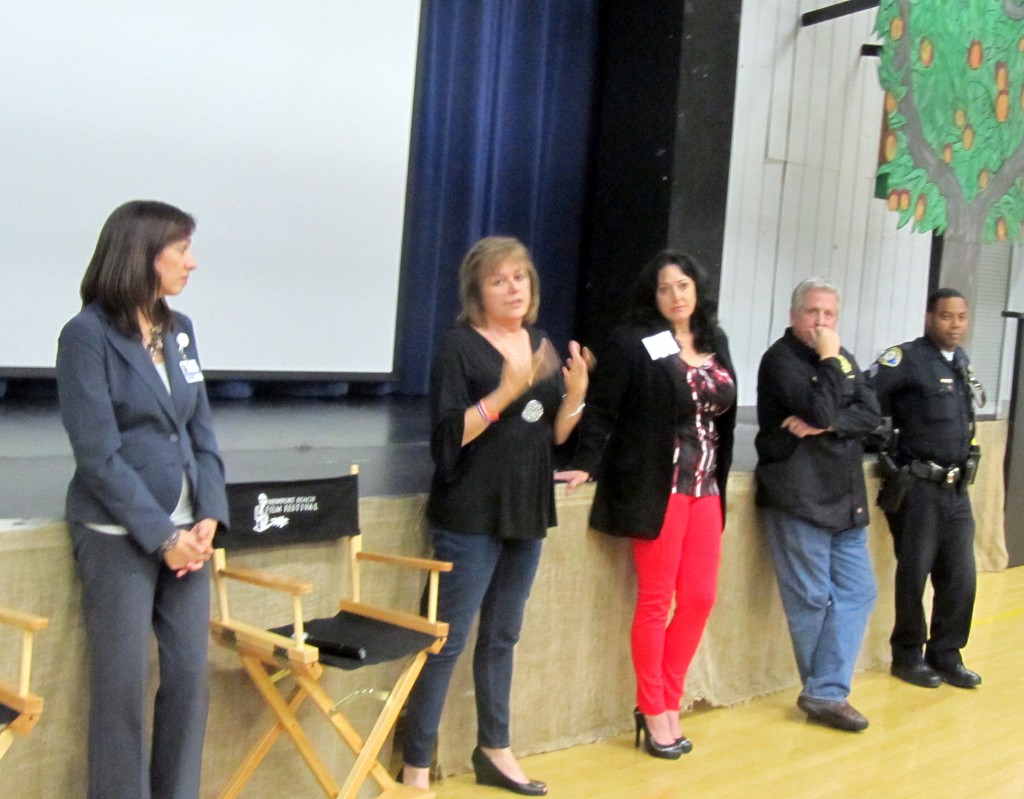
A group of students and parents got an eye-opening peek “Behind the Orange Curtain” Wednesday night, and into the world of addiction of prescription pills.
The Human Relations Council at Corona del Mar High School hosted a free screening of “Behind the Orange Curtain,” a documentary about the epidemic of kids in Orange County addicted to prescription pills.
“Hopefully it will open your eyes and save some lives tonight,” said Natalie Costa, the film’s executive producer, before the film began.
“We don’t want (students) to feel the need to turn to pills or other drugs,” said HRC advisor Denise Weiland, and education and awareness are key.
The event was held in the auditorium at Harbor Day School and featured a discussion panel that included Della Lisi Kerr, health education associate for the prescription drug initiative for the Orange County Public Health Department, Mark Nomady, a special agent with the Los Angeles division of the Drug Enforcement Administration, Vlad Anderson, an officer with the Newport Beach Police Department and school resource officer at Corona del Mar High School, and Michaell Rose, Mental Health Program Manager at Hoag Hospital, along with Costa.
The film explores the “mirage” of Orange County and the dangerous “pharmageddon” of prescription drug abuse, as commenter’s in the film described it. Parents of several kids who had died from overdoses were interviewed, along with recovering addicts, DEA, police, fire, coroner, and school authorities.
Several of those interviewed said prescription drugs are easier to come by now than marijuana or other illicit drugs. Many also described it as a gateway drug.
It’s an epidemic across the county, Costa explained, but it’s hit really hard in south Orange County.
Costa will be attending a funeral today, she told the crowd, for a young man from Aliso Viejo that passed away this week from heroin overdose. He had just got out of rehab. He came from a good family and lived in a nice neighborhood, she explained.
“This is the surprise,” Costa said. “These kids come from good homes, where parents are doing everything they can to give them a leg up on life, provide a great education, a great support system, and the question is why (does this still happen)?”
Even closer to home, it could have been called “Behind the Newport Beach Curtain,” Anderson said, because it is a problem in all of Orange County, and Newport Beach is no exception, he explained.
“I thought it identified a lot of problems we’ve been seeing in Orange County and a lot of things we’ve been trying to address with the parents at the local high schools, so hopefully they’ve taken something back from this because it is something that is impacting the nation,” Anderson said.
Newport Beach has some great schools, he said, and so much is done to try and protect them and set them up for success, at school and at home, yet there is this major risk out there that can easily destroy their future.
“That’s a difficult pill to swallow,” Anderson said.
Kids think their infallible, they’re fearless, Costa said. They will smoke marijuana at party, then maybe pop a pill in their mouth, and from there it takes off.
“Statistically speaking, if your kids smokes marijuana he also does prescription drugs,” Nomady said.
Kerr had a few suggestions for parents, including taking personal responsibility for their own prescription use, properly destroying medications, and keeping any controlled substances in lock boxes. She also talked about the legislature that state senator Mimi Walters is working on and the importance of getting involved.
There are also programs through the health department that provides will role playing situations so kids can learn how to get out of uncomfortable situations.
Costa also reminded the audience of the Good Samaritan law that went into effect Jan. 1, which gives limited protection from the law for people who call 911 when someone overdoses, even if they are high themselves or in possession of illegal drugs.
Several of the parents in the film said others around their children waited to call 911 when they overdosed, for fear of being arrested.
Parents often don’t think it could happen to their child, Costa said.
“All they have to do is: Open mouth, insert pill,” Costa said, adding it’s that easy for a problem to start.
“Half of you in the audience are in serious belief that this will never happen to your child and that this is about the lady next to you,” Rose said.
Costa said kids as young as eighth graders can view the film and parents should start talking with their kids as young as age 10.
“I thought it was very powerful, and scary,” said parent Pam Fortmuller. “It’s a strong message for the kids and it makes parents aware that it can be anybody’s child, including my own. It’s not the drug dealer on the corner that we have to worry about, it’s their group of friends. It’s troubling.”
Her son, Trey, 16, a sophomore at Corona del Mar High School and member of HRC, said it’s not an issue with his friends.
“I have a close group of friends that are committed to being against that kind of thing,” he said.
Although it does apply to his overall high school experience, he added, simply because it’s out there and kids often start in high school.
The film was “very impactful, very meaningful,” Trey Fortmuller said. Films like this really change the tone in the room and can change people behavior, he added.
“I’ll definitely be more proactive,” he said, and do his best, in his own way, to help classmates that might have a problem.
“Even wearing an HRC shirt, I suddenly become more powerful, with the support of all the other (HRC) kids behind me,” he said, and together they can make a difference.
Parents should be on the lookout for each other’s kids as well, the panel experts said.
“This is the day and age that if you don’t open your mouth and tell that parent you know this child is doing something, you could be going to their funeral,“ Costa said. “That’s how serious this is.”
For more information visit behindtheorangecurtain.net




